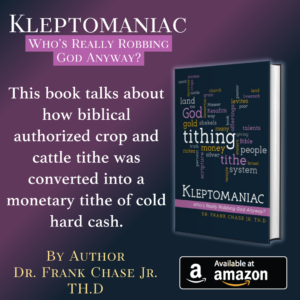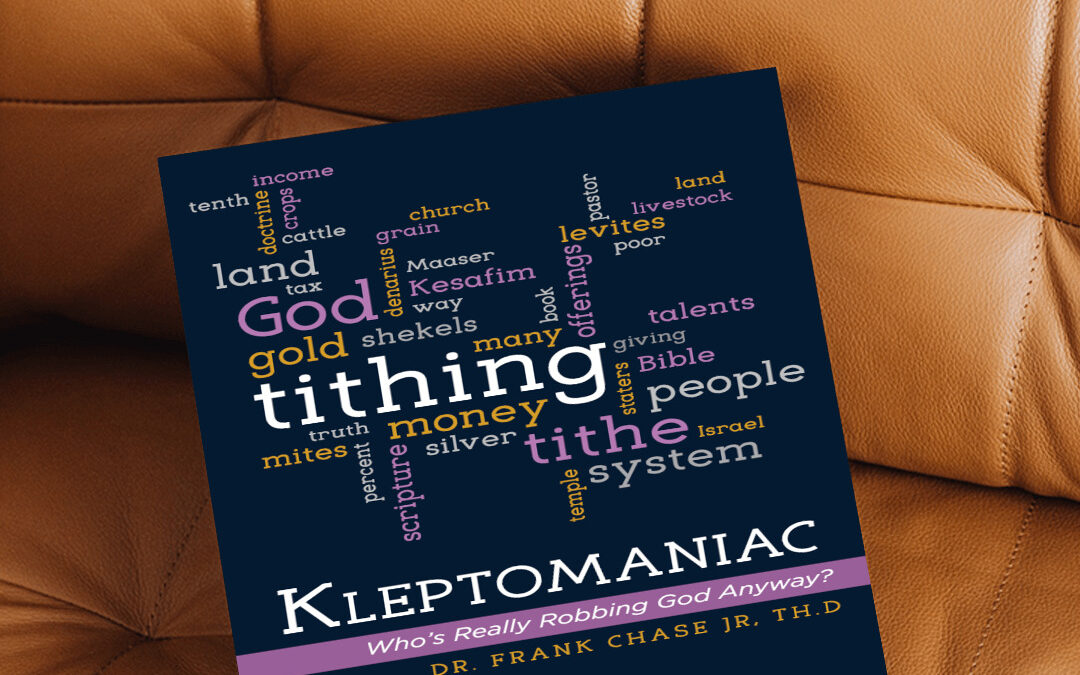
“Kleptomaniac: Who’s Really Robbing God Anyway” authored by Dr. Frank Chase Jr is a meticulously researched, insightful and thought-provoking book that challenges long-standing beliefs and practices surrounding the act of monetary tithing and giving and raises critical questions about the nature of financial contributions within the context of faith and the historical roots of monetary tithing.
For centuries, religious institutions have taught their followers about the importance of tithes and offerings as a means of honoring and serving a higher power. The faithful have dutifully contributed a portion of their earnings, often ten percent, to support their places of worship, the clergy, and various charitable causes. This act of giving has been instilled with a sense of righteousness, duty, and divine obligation, and countless believers have faithfully adhered to this practice.
As the narrative unfolds, “Kleptomaniac” dives into the present-day realities of tithing, discussing its prevalence in various religious denominations and the impact it has on the lives of both congregants and religious leaders. Dr. Chase examines the ways in which tithing has been used, or misused, to manipulate and control believers, and how it has sometimes created financial burdens for struggling individuals and families. Readers are confronted with eye-opening revelations about the historical context of tithing and its evolution over time. The book examines the various interpretations and misinterpretations of religious tithing texts that have led to differing viewpoints on tithing within different faith traditions.
The book traverses ancient biblical tithing texts to explore and uncover the historical origins and evolution of tithes and offerings by tracing its roots back to ancient times when tithing was a land-based system of crops and livestock to support biblical Levites and the poor and how that land-based system of tithing morphed into a monetary system to support religious institutions and clergy. Dr. Chase examines biblical texts and religious traditions, shedding light on the scriptural interpretations and misinterpretations that have shaped contemporary tithing practices. He draws from historical records, extensive research and in-depth biblical analysis and interpretations, and presents a comprehensive analysis of how the authentic biblical tithe of crops and livestock evolved and over time and got commuted to the monetary tithing monstrosity it has become today. He also details how the tithing doctrine shapes religious institutions and influences believers for good and for bad and presents a compelling case that challenges the conventional teachings on monetary tithing.
While “Kleptomaniac: Who’s Really Robbing God Anyway?” challenges traditional monetary tithing paradigms, it does not aim to discourage giving but instead advocates for a more thoughtful, informed and accurate biblical approach and understanding of what tithing really is. The book encourages readers to question established tithing norms, seek transparency in their religious organizations, and engage in meaningful discussions about the role of money and spirituality.
The book discusses the idea of whether God is truly being robbed by those who do not monetarily pay tithes as religious leaders claim. Dr. Chase encourages readers to critically assess the motivations behind modern monetary income tithing and the resulting consequences on both personal finances and the larger religious community.
Moreover, “Kleptomaniac: Who Really Robbing God Anyway?” invites readers to question the status quo – to engage in open, respectful dialogue with religious leaders and fellow congregants about the real meaning of tithing. Reading the book will encourage you to challenge long-standing beliefs, seek clarity in your own spiritual journey, and pursue a balanced, compassionate, and authentic approach to New Testament giving.
In the end, “Kleptomaniac: Who’s Really Robbing God Anyway?” serves as a catalyst for reevaluating long-held beliefs and practices surrounding tithing and offers readers a fresh perspective on how they can support their faith communities responsibly and authentically. The book is revelatory, challenges long-held beliefs and prompts readers to question the traditions they’ve been taught about monetary tithing. It empowers individuals to reclaim their agency over their faith and financial decisions, providing a fresh perspective on spirituality, giving, and the true essence of religious devotion. With its insightful analysis and thought-provoking arguments, the book sparks important conversations about the intersection of tithing religion, finance, and personal beliefs in contemporary society.
In conclusion, “Kleptomaniac: Who’s Really Robbing God Anyway?” whether a believer or a skeptic, is a book that is an essential read for anyone seeking to explore the intricate relationship between money, faith, giving and true tithing.
Chapter-by-Chapter Summary
Introduction. Monetary tithing vs. biblical tithing is the most understudied subject across the spectrum of theological and religious institutions. This book will break open the seal on tithes and offerings and expose the untwisted truth about the century’s old doctrines and its deceptive contemporary teachings.
Chapter 1: My Story for Writing This Book
This chapter explains why Kleptomaniac: Who’s Really Robbing God Anyway came to fruition. The chapter gives a detailed account of why the author wrote the book and explains the saga of events that lead to the shocking discovery of learning the truth about tithing.
Chapter 2: A lesson in Necessary Definitions
The problem with explaining any subject should start with as empirical thesis. By the end of the chapter the reader will have a thorough definition of the word tithe, its Hebrew and Greek meaning and its limited biblical application today.
Chapter 3: Abram’s Tithe Before the Law and the Established Covenants
Pre-law tithing is what this chapter covers, and it also defines why the so-called monetary tithe of modern times has no relationship to the tithe Abram gave. Readers will learn about the giving requirements established under different covenants God established by the end of the chapter, readers will know there is a difference between money and tithing and that the two terms are not synonymous
Chapter 4: The Life of Abram and His Father
Since many modern tithe arguments are based on Abram’s one single instance of paying a tithe, this chapter explores the family history of Abram and what he understood God, tithes and money.
Chapter 5: Jacob’s Tithe Proposal
This chapter examines Jacob’s tithe offer to God in exchange for his protection. It will be clear to readers by the end of the chapter why most sermons on tithing never include references to Jacob and more about Abraham’s tithe.
Chapter 6: Show Me the Money
The merits of monetary tithing should be based on whether evidence exists in the scripture as to its practice. However, this chapter examines all biblical references to money in the Bible to determine if money was tithed to the temple or synagogue in the first century church. This chapter gives detailed accounts of how money was used in Israel.
Chapter 7: The Tithe in Israel
Many people believe modern tithing is monetary. But this chapter challenges that assumption and examines tithing based on the land, language and literature of the Israelite people from a Hebrew perspective. It details why God authorized the tithe for the Levites and why more than one tithe existed in Israel. By the end of the chapter, readers will know that God authorized two separate inheritance packages, one for the 11 tribes of Israel and another for the Levitical priesthood tribe who represented the temple.

Chapter 8: Did the Levites Work Full-time or Part-time in the Temple?
The indefensible argument that pastors and churches continue to propagate is that they cannot work because they are called to the ministry. However, the Bible disputes that assertion because the chapter examines the Levites duties in the temple and proves they worked jobs as the preachers of the Old Testament.
Chapter 9: Can Money Be Required First Fruits?
People come up with different methods to extract money from people. The Bible is often used in ways that leaves one questioning the motives for such action. One of those actions is that money can be called first fruits. This chapter exposes the misinterpretation of first fruits and places it back in its original language and context. Readers will know the difference between the two terms and understand that money has no relationship to first fruits because they are edible items.
Chapter 10: Malachi is the Smokescreen for Tithing
In this chapter the smokescreen for tithing is put under the microscope of scripture and by the time the reader finishes it, there will be no confusion about why Malachi is not a command to pay money as a tithe to the church. The text examines the argument that the church and storehouse are one in the same. Malachi chapter 3:8-11 will be dissected and examined to flush the details of who’s really robbing God of tithes and offerings. Although, this verse is applied to congregants, this chapter disputes that assertion and explains who the real God robbers are.
Chapter 11: How to Refute Unbiblical Tithing Statements
Many arguments put for by tithe proponent have never been really examined based on scripture. This chapter examines pro-tithe arguments and explains the misinformation that undergirds the argument. The chapter also gives alternatives explanations as to why the tithing positions are out of context of scripture. The reader will learn how to dismantle unscriptural tithe arguments based in theological facts and not subjective interpretation.
Chapter 12: Giving in the Gospels
The church gives all kind of reasons why someone should give their money, but in this chapter, giving is examined in the Gospels and explains what Jesus believed about giving and how his ministry obtained financial support. By the end of the chapter, readers will know that the giving methods implemented in the church are not always what the Bible actually teaches.
Chapter 13: Did Paul Convert the tithe to Money?
Many tithe arguments can be settled by simply studying Paul’s teaching on giving. This chapter goes into detail about Paul’s giving habits, his family background and explains why he would never teach or suggest that paying money as a tithe was mandatory in the New Testament.
Chapter 14: First Corinthians 16: Giving to the Needy Saints
This chapter explores the teachings of Paul and what he meant in references to giving. The reader will learn that the context of giving verses in the Bible do not address how modern churches are to financially sustain themselves. However, the chapter gives insight into Paul’s connection to helping those in need and why that was important for all believers.
Chapter 15: A Discussion of Paul’s Work History and Ministry Needs
In this chapter, readers will get a history lesson on Paul’s work history and why he never advocated for monetary tithing. It is said that pastors can’t work today because they have the responsibility of caring for the church. But the argument put forth about Paul’s background as a tentmaker employee brings into question that pastors can’t or should not work. This chapter is a behind the scenes look into first century employment and bi-vocational ministry.
Chapter 16: New Testament Giving Principles Verses Old Testament Tithing
Throughout the entire book tithing in all its forms have been discussed extensively. In this chapter, we explore the nature of giving as the New Covenant dictates and explain why the tithing laws are not applicable to believers today because our covenant has better promises than the requirements of the Old Testament tithe laws. This chapter teaches believer how to become free-will givers without misinterpreted tithing laws, which are not related to money.

Scan Code to Purchase Book
An Excerpt About Abram’s Tithe
The author John Seldon in his book, The History of Tithes, published in 1618 stated that the phrase “tithes of all” in the Hebrew text from Genesis 14:20 refers only to the spoils Abram had taken in rescuing his nephew, Lot (Seldon 1618: 1, 2).[i] Jewish historian, Josephus who wrote much about the Jewish wars argued that Abram’s “tithes of all” was not his personal wealth. He said that Abram’s tithe was the tenth part of his prey (captured war booty) that Melchizedek accepted as a gift.
The Spoils of War Tithe

To understand what Abram might have tithed from, we must further examine what the spoils were and what the word tithe means in Hebrew and Greek. A puzzling question about Abram’s tithe is whether he gave the tithe to Melchizedek as a king or as a priest, or was his tithe based upon a war custom. Is Abram’s tithe an example of an eternal tithing law of God in a pre-law, pre-monetary society? Melchizedek’s kingship is mentioned first, and his priesthood is mentioned second. As a king, he brought Abram bread and wine. Does scriptural evidence prove this tithe was based on a war custom and not freewill even though the verse says, “gave,” which implies freewill? Since the context is not silent, the tithe Abram gives fits the pattern of a war tithe. However, like anything in the Bible, everyone must study and determine within their heart whether the tithe Abram gave was of his own volition. Arguments can be made for both sides.
If tithe proponents say they are following Abram’s tithe practice as an act of faith based on a pre-law eternal principal to qualify as blessed, then the context of the Scripture requires you to tithe only once and that you do it when you turn 80 years old. Abram tithed once when he turned 80; he lived to be 175. The Bible states that Abram met Melchizedek only once, so there is no way anyone can extrapolate a weekly, monthly or biweekly tithe from the text.
[i] Seldon, J. (n.d.). The History of Tithes. Retrieved August 18, 2015,
from http://ials.sas.ac.uk/digital/1600s/Selden/Selden_1618_1801751627_ft_part2.pdf.




Recent Comments